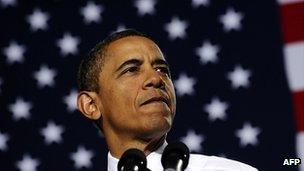Echoes of Washington in euro deal
- Published
- comments

Obama faces a Congress reluctant to agree to his own chosen economic agenda
You can imagine President Barack Obama on the sidelines, impatiently tapping his foot, watching what is going on across the Atlantic.
His statement on the euro agreement goes beyond the usual "well done chaps" sort of comment, although it certainly contains that.
"We welcome the important decisions made last night by the European Union which lay a critical foundation for a comprehensive solution to the Eurozone crisis," he says.
But he goes on: "We look forward to the full development and rapid implementation of their plan."
An earlier statement from the White House made reference to the fragile world economy. The feeling here is that things are very slowly getting better, but that any slight blow could knock the barely perceptible recovery off course.
That the Europeans are seen as moving forward together with all the verve and speed of a herd of tranquilised snails does not go down well in the US.
If you can't hear the exasperation in the president's statement his spokesman Jay Carney has made it clear: "We will continue to encourage and help them move forward towards rapid and complete implementation."
In truth, the president and his team should be more sympathetic. The White House cannot get its own plans through Congress. That's politics.
It is politics too that is holding up the European deal, buried as it might be in the wonkish detail.
There is a pretty direct parallel. The USA is a federal system, designed to slow down anything that takes power away from the component parts. "Rapid implementation" is indeed what is required in Europe, but it has huge political consequences, which aren't even being discussed right now.
So here it is in American: Europe's hesitation is in part about "states' rights" and the plan to open up its version of the US constitution yet again to allow more power to the federal government.
But, understandably. the White House is focused on the economic, not the political, fallout.